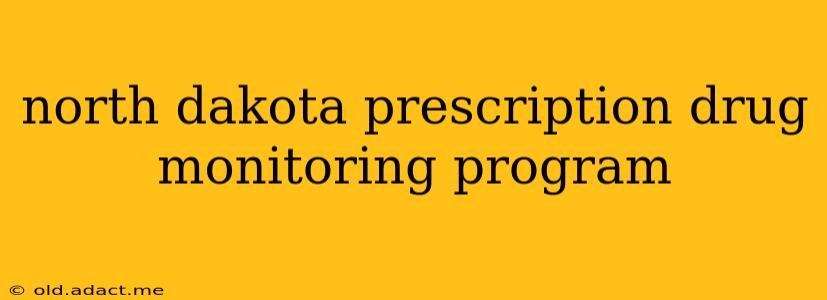North Dakota's Prescription Drug Monitoring Program (ND PDMP), officially known as the North Dakota Controlled Substances Reporting System (ND CRS), is a crucial tool in the fight against opioid abuse and prescription drug misuse. This program provides healthcare professionals with access to a patient's controlled substance prescription history, allowing for more informed prescribing decisions and ultimately, safer patient care. This detailed guide will explain its functionalities, access requirements, and overall importance in public health.
What is the North Dakota Prescription Drug Monitoring Program (ND PDMP)?
The ND PDMP is a state-sponsored database that tracks the dispensing of controlled substances within North Dakota. Pharmacies are required to report all dispensed controlled substances to the database, which healthcare providers can then access to review a patient's prescription history. This information helps identify potential instances of doctor shopping (seeking prescriptions from multiple providers), prescription forgery, and overall patterns of misuse. The goal is to prevent prescription drug abuse and diversion while facilitating legitimate pain management for patients who genuinely need it.
Who Can Access the North Dakota PDMP?
Access to the ND PDMP is restricted to authorized individuals involved in patient care. This typically includes:
- Physicians: Doctors of all specialties who prescribe controlled substances.
- Physician Assistants: Working under the supervision of a licensed physician.
- Nurse Practitioners: Licensed to prescribe controlled substances.
- Pharmacists: To verify prescriptions and identify potential red flags.
- Law Enforcement Officers: Under specific circumstances and with proper authorization.
Access is granted through a secure online portal requiring individual credentials and adherence to strict privacy regulations.
How Does the North Dakota PDMP Help Combat Opioid Abuse?
The ND PDMP plays a vital role in reducing opioid abuse and overdose deaths by:
- Identifying potential prescription drug abuse: By providing a comprehensive view of a patient's prescription history, providers can readily identify patients exhibiting patterns of misuse or doctor shopping.
- Improving prescribing practices: Access to this information helps healthcare professionals make more informed decisions about prescribing controlled substances, tailoring treatment plans to minimize risks.
- Reducing the risk of diversion: The tracking capabilities of the system deter individuals from attempting to obtain prescriptions fraudulently from multiple sources.
- Facilitating better patient care: By providing a clearer picture of a patient's medication history, it allows for more effective communication and coordination of care among healthcare providers.
What Information is Contained in the ND PDMP?
The ND PDMP database contains detailed information about dispensed controlled substances, including:
- Patient's identifying information: Name, date of birth, and address (protected by strict confidentiality protocols).
- Prescriber information: The prescribing physician's name and license number.
- Pharmacy information: The dispensing pharmacy's name and location.
- Medication details: The name and quantity of the controlled substance dispensed.
- Date of dispensing: The date the prescription was filled.
What are the Benefits of Using the North Dakota PDMP?
The benefits of utilizing the ND PDMP extend to patients, healthcare providers, and the overall public health:
- Improved patient safety: By helping to prevent prescription drug abuse and overdose, the program contributes to safer patient outcomes.
- Reduced healthcare costs: Preventing addiction and its associated complications reduces long-term healthcare expenditures.
- Stronger community health: A decrease in prescription drug abuse leads to healthier communities with fewer instances of crime and overdose deaths.
- Enhanced prescribing practices: Providing healthcare providers with better tools for responsible prescribing.
How Can I Access the North Dakota PDMP?
To access the ND PDMP, you must be a licensed healthcare professional authorized to prescribe controlled substances in North Dakota. You will need to register with the state's designated agency and complete necessary training to obtain access credentials. Specific instructions and application processes can be found on the official North Dakota Department of Health website. Remember that unauthorized access to the PDMP is illegal and carries severe penalties.
This information is for educational purposes only and should not be considered medical advice. Always consult with a healthcare professional for any health concerns.
